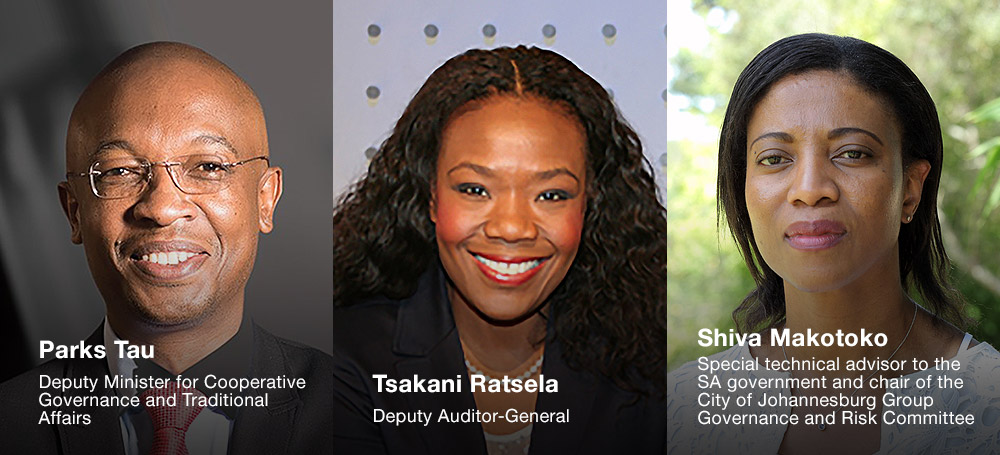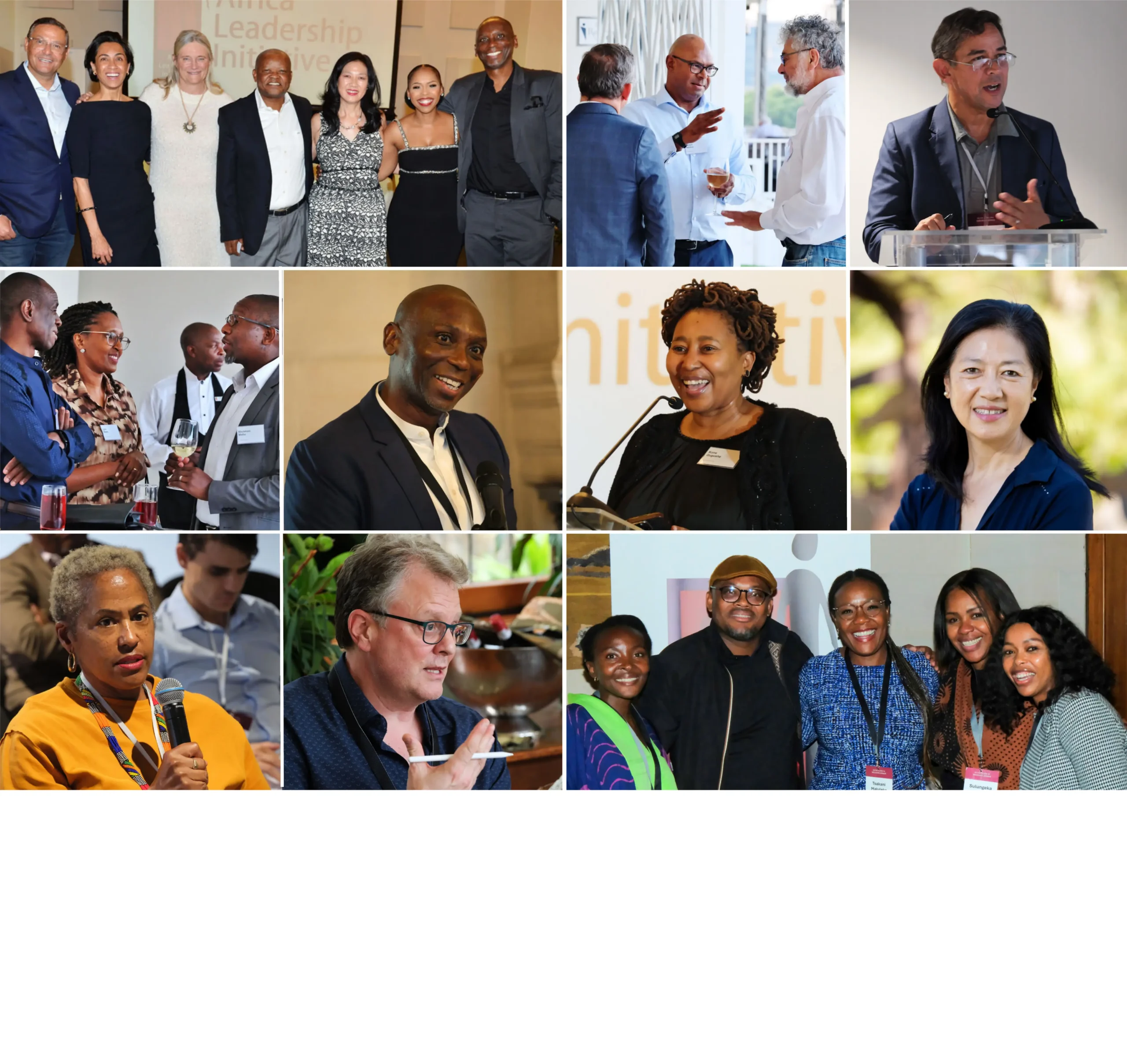
ALI stands for a commitment to contribute to a set of lasting interventions towards the Good Society. The municipal audit results, under the theme “not much to go around, yet not the right hands at the till”, came at a particularly bleak time – a time when the Good Society feels like it may be an impossible dream. For some, the last straw has been questionable tender awards relating to the pandemic, compounding cynicism about government’s leadership and the trauma of economic collapse. Many South Africans simply no longer believe in the government’s bona fides and abilities.
Hope has been eroded.
How, in this climate, can ALI Fellows play an active role as citizens to achieve the society we seek?
Speaking first, Tsakani had few silver linings to offer. The story the audit report tells is that more and more municipalities are simply not submitting financials; some have unpaid accounts going back to 2013, she said. South African municipalities spent R1,26bn of public money in the most recent tax year hiring consultants to put their financial statements together, but still, only 18% of the country’s municipalities were able to submit their books for audit on time.
Watch the dialogue (Password: .^Ib!6CN)
HOW DID IT GET TO THIS?
Poor records management is one thing that undermines many municipalities, Tsakani said. High churn in critical roles is another, and often key people don’t have the skills or insights they need. But the big issue is compliance: around R32bn during the last financial year of irregular expenditure is currently haunting municipalities. Tsakani’s assessment is that there simply aren’t enough stable and adequate controls, exercised by competent people, who stay in their roles long enough to achieve the quality of governance needed to make sure municipalities work.
Speaking next, Parks argued that some of this irregular expenditure was a systemic malfunction rather than a function of corrupt internal processes. He gave the example of a low-revenue, poor-delivery municipality struggling to recruit the quality of accountant or engineer needed to manage critical functions. Municipalities must, for instance, engage with Eskom on consumption expectations month to month; if the municipality exceeds predicted usage, penalties apply. On municipal debt, interest of prime+5% applies. The Auditor General defines this penalty and interest payments as fruitless and wasteful expenditure.
Parks argued that municipalities are over-regulated. He cited a Law Reform Commission report (2019) which, amongst other things, identified that processes required are costly and difficult to execute; that due to the difficulty in execution, there was an over-reliance on specialist consultants; and that the regulatory environment stifles innovation, in the sense that compliance with rules becomes more important than achieving the objective behind these rules. So there is a perverse incentive to practitioners to do less, creating a disjunct between objectives and execution.
Although malfeasance amongst officials should not be discounted, Parks noted that municipalities spend millions on compliance in an environment in which regulations don’t talk to one another. “We need a system that is well regulated without undermining control.”
Shiva raised a further level of complexity: rent-seeking between public servants and private sector. “The corruption, financial mismanagement and failings that this report points to, can also be located in the way that private sector is interacting with government,” she said.
She posed several interesting questions: What would be possible in a model that brings government together at a regional level to deal with the issue of hollowing out of government capacity? And, as we now have a citizen who is no longer able to pay for services, how might government engage with the private sector to resolve this? And, finally, is it time to look at AI as a way of addressing financial mismanagement?
The government recognises that the technical skills it needs are not readily available. But investing in upskilling officials is not necessarily an investment in a more skilled government: for example “Treasury will tell you that 90% of relevant local officials were trained in supply chain management, but almost half of these immediately left to the private sector.”
In opening the conversation to the floor, Dele described municipal failure as an urgent and vital problem that will unsettle, divide and break our country. He referred to the core issues of accountability, especially in terms of procurement and contract management; design problems concerning the regulatory environment; capacity problems; and the rent seeking which is “at the heart of our darkness”. He noted the correlation between better resourced provinces of Gauteng and Western Cape, and the performance of their local authorities. Are we too focused on getting good people into government – should we not be thinking about blockchain and other technologies to address graft? he asked.
The conversation that followed flowed around the issues of levels of government and the effectiveness that can be assumed in different models: a unitary state rather than provinces; mechanisms to deploy the right skills and technology into district hubs (the district development model) with shared services for municipalities; the scourge of “poli-officials”, or officials who follow politicians’ instructions, rather than who genuinely operate as public servants. “I’ve seen clients washing their hands of delivery and deciding just to focus on compliance,” said Yoliswa Msweli. How might we delink party-politics from local government?
Mike Mulcahy pointed out an obvious failing in the current checks and balances: “You can’t fix an ethical problem with a system or compliance requirements,” he said, adding that while auditors can report on spending, they don’t interrogate the efficiency of that spending, “whether it was a band-aid or a thoughtful solution”, especially with regard to the stress points of city-making, like energy, water and waste considerations. Referring to Parks’ comment that the current system perversely incentivises inaction, he said: “We need to shift the focus from scarcity and risk aversion into understanding the asset base and the opportunity for municipalities to leverage their asset base to buy better services that are more sustainable and which support their communities.
“Managers and CFOs have to decide how to make this shift.”
But how do we get our best people to apply their minds to the system? Bongiwe Njobe, who has deep experience across both public and private sectors, argued for differential remuneration and incentivisation which would attract South Africa’s best minds to go and solve for these problems which are at the heart of development. In the comments scroll, the call for purpose-driven and outcomes-invested public servants struck a chord, with one of the responders calling to build public sector capacity “such that younger, energetic, dedicated practitioner can render much needed services with future in mind – late millennials and Z Gens will be reaping the fruits of whatever seeds are planted now – good or bad, worsening poverty or prosperity at local level.”
This conversation has continued intensely since the Dialogue with many saying that the urgency is understated and that the opportunity to build an improved relationship between government, academia and the private sector is available. Tsakani believes that basic and significant improvements can be made.
Utilising the developing District model to build Internal audit, engineering and other capacity is support of less resourced municipalities is one initiative. Shiva says that small improvements in financial wastage can release much money for testing innovative approaches to governing municipal finance. The use of block chain and AI to manage the controls from budget to procurement and then audit is another. Government is open to revisiting regulation to streamline systems. The professionalising of the civil service is vital but longer term.
Parks stressed that to make a career in the public sector attractive to our best people, a deep culture change is needed. “Many people leave because their time is spent sitting in meetings, writing reports, and defending reports,” he said. In the end, Tsakani noted it comes down to leadership. Strengthening political, administrative and operational leadership is foundational: until then, reducing the compliance burden, and introducing useful technologies alone won’t allow government to attract the right people into that right environment.
Further reading: download the auditor-general’s municipal audit results.









